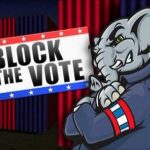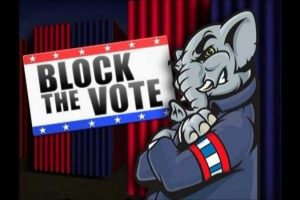
Hillary Clinton said on CNN this weekend that repealing Section 230 of federal communications law should be a top political priority.
The former secretary of state’s comments are a reminder that this vital protection for free speech is far from safe, even if we seem to be on the other side of peak anti-230 politics.
Want more on sex, technology, bodily autonomy, law, and online culture? Subscribe to Sex & Tech from Reason and Elizabeth Nolan Brown.
Why Politicians Hate Section 230
For anyone who needs a quick refresher: Section 230 protects digital service providers and users from liability for the speech of others. It’s really that simple, despite a lot of misinformation about Section 230 that gets thrown around. Section 230 is why Facebook isn’t liable if someone uses its messaging system to set up a drug deal; it’s why Reason isn’t liable if one of our commenters posts an actionable threat.
The law is vital for allowing free speech to flourish online, because without it companies would have a strong incentive to suppress much more user-generated content. It’s vital for companies that want to rein in certain sorts of speech on their own specific platforms as well—allowing them to moderate and suppress spam, hateful rhetoric, pornography, or any other types of speech they find objectionable. (It does not require the moderation of these types of speech. It merely makes it OK for companies to do so without taking on additional legal liability.)
A lot of politicians hate Section 230 precisely because it makes it more difficult for them to censor what is said online, while others hate Section 230 because it allows private companies to avoid hosting speech the politicians like. The bottom line is that both Democrats and Republicans would like to weaken or abolish Section 230, and that doing so would give government authorities more control over the internet.
During Donald Trump’s presidency, he was an enthusiastic advocate for repealing Section 230. This sort of anti-230 sentiment and action from both major parties has continued into Joe Biden’s. And while anti-Section 230 sentiment has quieted down a bit in recent years, Clinton’s comments serve as a good reminder that a lot of powerful people still have it out for this law.
Clinton’s Recent Comments
“We should be, in my view, repealing something called Section 230, which gave, you know, platforms on the internet immunity because they were thought to be just pass-throughs, that they shouldn’t be judged for the content that is posted,” Clinton told CNN host Michael Smerconish on Saturday.
Clinton makes this sound like some sort of aberration or anomaly. But a lot of platforms are basically “pass-throughs” for the speech of others, and not holding them responsible for content they didn’t create themselves isn’t crazy at all. If a person on private property engages in speech that is somehow criminal, we don’t hold the property owner liable. If people use the telephone to hatch criminal plans, we don’t arrest the phone company. If I use a Sharpie and to write you a threatening letter and then send it in the mail, you can’t sue the makers of Sharpie or the U.S. Postal Service.
Some argue that entities like X and Instagram and TikTok are more like a newspaper than the postal service or a phone company or a physical building. But newspapers employ editors to make conscious decisions about the content that they publish. They do not allow anyone to use their pages to broadcast their thoughts, as social platforms do. And the fact that social platforms do try to reject certain sorts of content doesn’t magically make them cognizant co-creators of everything everyone publishes.
In her CNN interview, Clinton went on to make the ridiculous but all too common suggestion that social media companies aren’t actively monitoring and moderating content. “If the platforms—whether it’s Facebook or Twitter/X or Instagram or TikTok, whatever they are—if they don’t moderate and monitor the content, we lose total control,” she said.
Politicians love this myth too. It implies that if the government could just pass laws requiring tech companies to do better, all the bad stuff online will go away.
In reality, social media companies devote massive resources to moderating content. But the nature of these platforms means that no matter how watchful they are and no matter how much bad stuff they filter out, some objectionable or criminal speech will get through no matter what. Moreover, some speech that politicians find objectionable is content at the core of free speech. There’s no amount of neutral content moderation and suppression that will satisfy them; they think companies should have to suppress ideas they don’t like, stories that make their side look bad, and so on.
Clinton told CNN that “national action” to regulate tech companies “should be at the top of every legislative, political agenda.” And alas, no matter who wins the presidential election in November, we’re likely to see a leader who wants to weaken or abolish this law. Not only does Trump oppose Section 230, but Democratic nominee Kamala Harris has been crusading to weaken Section 230 since her days as attorney general of California.
The president cannot unilaterally abolish Section 230, of course. But he or she can push for Congress to do so, and many members of Congress have proved all too happy to take up this agenda already. The president can also order federal agencies to interpret Section 230 in ways that could weaken its protections, as Trump tried to do with the Federal Communications Commission in 2020.
More Sex & Tech News
• California can’t order people to take down “deepfakes,” a federal judge ruled last Wednesday.
• The great deepfake panic of 1912: “In recent weeks there has been a flurry of laws, regulatory proposals, and lawsuits regarding ‘deepfakes,’ along with the usual rising levels of concern in the media about how the world won’t be able to handle this,” notes Louis Anslow at Techdirt. “For some perspective, the Pessimist’s Archive just published a story highlighting how a nearly identical fear gripped the world in 1912 regarding ‘fake’ photos.”
• A new study from the University of Oxford finds that playing video games can be a mood booster.
• Google’s dominance in online searches is being challenged by TikTok and the AI startup Perplexity, reports The Wall Street Journal. It’s yet another reminder that free markets take care of competition much better than government antitrust suits can.
• Under Federal Trade Commission (FTC) Chair Lina Khan, the agency shifted “in focus away from obvious harm to the consumer” and “removed language stating its commitment to not hindering legitimate business activity,” leading it “to war against Microsoft, Meta, Google and Amazon,” writes Stephen Kent in a piece arguing that if Harris becomes president she should ditch Khan. “Candidate Harris shares Khan’s proclivity for blaming inflation and higher prices of gadgets and groceries on corporate misbehavior,” writes Kent. “But if Harris wins the presidency, she will have done so on the promise of understanding middle-class concerns. You don’t see Harris campaigning in the suburbs against one-day Amazon Prime deliveries and Prime Day deals on televisions, which is exactly what Khan is up to in her case against Amazon.”
• Another “bounty” law resists legal challenge. This is the model under which Texas passed a high-profile abortion ban that is to be enforced not by the state but by private lawsuits. A Utah age verification law shares a similar structure—and a panel of 10th Circuit Court of Appeals judges just upheld a lower court’s dismissal of a Free Speech Coalition lawsuit challenging it.










